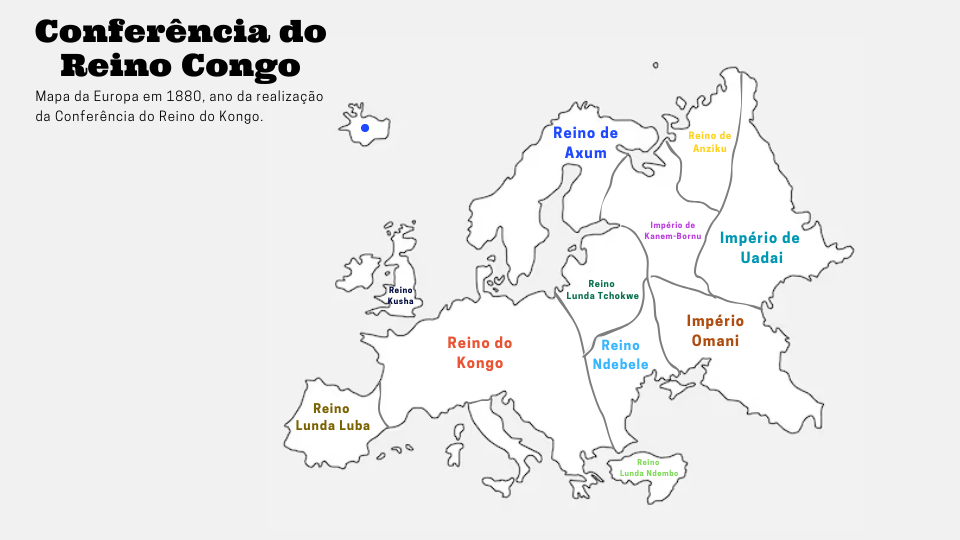The Encounters of the Congo-Nation project directly dialogues with the cultural, historical, and socio-political context of Angola and the region of the former Kingdom of Congo, a territory that now extends into the Democratic Republic of Congo. These areas were profoundly influenced by the dynamics of the Berlin Conference (1885), whose effects are still felt today: artificial borders, identity fragmentation, cultural marginalisation, and erasure of pre-colonial African memories.
Pode encontrar uma tradução para português aqui
The Berlin Conference took place in Germany, a meeting of white heads of government who divided up Africa among themselves and took “possession” of it. The effects are still visible: almost all countries in Africa have names that were given to them from outside, national borders divided “nations”, and the exploitation of the continent by the global West continues to present day. 150 years later, traces of a similar conference were discovered in today's Angola, in the former Kingdom of Congo, where rulers met at the same time to divide up Europe among themselves. The Encounters of the Congo-Nation project is an African vision of the future from the past that turns the absurdity of colonisation on its head.
Angola is currently experiencing a moment of revaluing its traditional cultural expressions and affirming a new artistic generation that seeks to critically revisit the colonial past. However, much of the cultural production remains concentrated in Luanda, excluding other regions and voices. There is also a lack of intergenerational dialogue spaces, artistic experimentation, and training, not only outside major urban centres.
Economic instability, exacerbated by currency crises and a lack of public investment in the cultural and educational sector, hinders artists and researchers from accessing resources and visibility platforms. Additionally, the official discourse on national history often devalues or silences the contributions of historical kingdoms like Congo, limiting the understanding of the diversity that constitutes Angola’s identity.
Turning the absurdity of colonisation on its head
Encounters of the Congo-Nations aims to turn these conversations around, by:
- Cultural decentralisation: The project undertakes activities in regions outside Luanda (such as Dundo and areas of Mbanza Kongo), promoting access to artistic creation, training, and enjoyment in territories generally excluded.
- Historical re-appropriation: By reinventing an alternative narrative to the Berlin Conference, the project stimulates critical reflection on colonial legacies and promotes the value of ancestral African knowledge.
- Training and empowerment: Workshops provide artistic and technical training to young local creators, fostering skills and encouraging collaboration networks.
- Regional cooperation: By involving partners from various cultural institutions in Angola and Democratic Republic of Congo, the project strengthens historical and cultural ties between peoples separated by colonial borders.
The project is artistically staged with workshops leading to a conference, in easily accessible (multilingual, incl. Kikongo) online publications, and in live broadcasted radio show. The project takes a multi-perspective and inclusive approach to a fiction and emancipates itself from the continuation of history-writing from the outside. Civil society groups, artists and academics embark on a fictitious search for traces of the Encounter of the Congo-Nation in the former Kingdom of Congo (1390-1914). All projects will come together in a festival in June 2026, creating an impact in the Angolan society via radio, Internet and live.
Alignment with the UN Sustainable Development Goals
- SDG 4, Quality education: mediation activities (meetings, workshops, publications) aim to transmit critical knowledge about colonial history to young and adult audiences, in an inclusive and participatory approach
- SDG 5, Gender equality: the project will focus, with the partnership of AIA, on women and LGTBQ+ rights. The project assures that between the participants there will be at least 50% women and non-binary people.
- SDG 10, Reducing inequalities: the project challenges post-colonial hierarchies and highlights a vision of colonialism, there will be an equal payment for the artists, independent from their home countries.
- SDG 16, Peace, justice and effective institutions: by making hidden memories and traumas visible and by promoting intercultural dialogue, our project contributes to the exploration of collective decolonial memory and to social cohesion.

